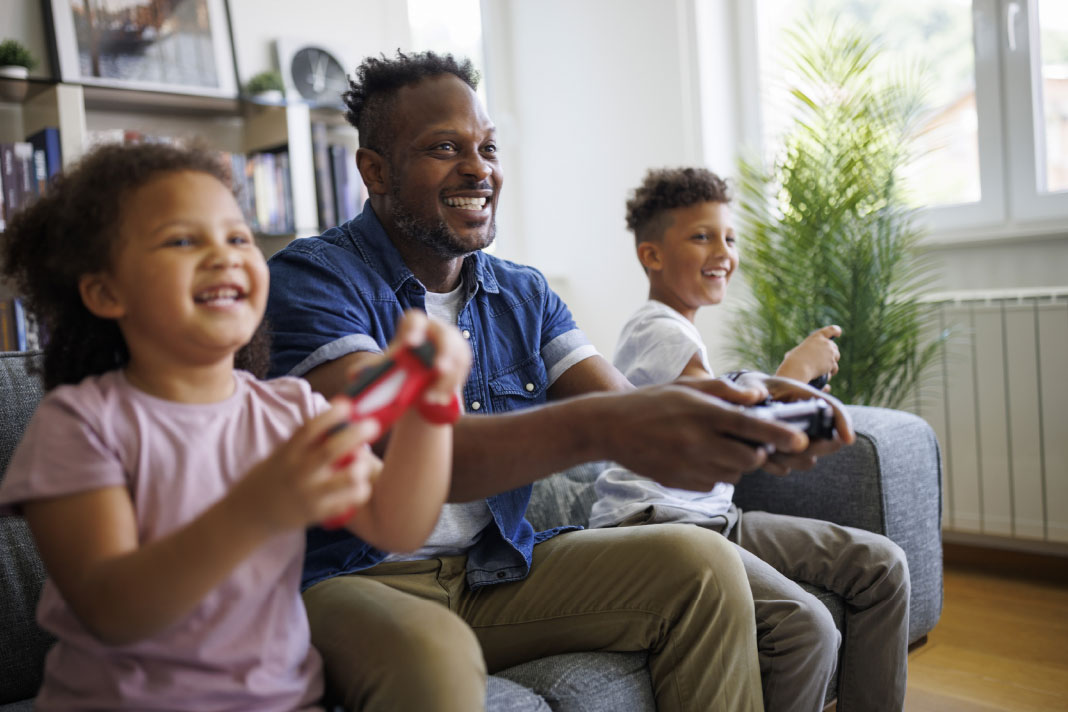Video games captivate children but balancing screen time is key. Ouiam El Hassani explores how parents can guide kids to game mindfully, fostering self-awareness, resilience and responsible digital habits without conflict.
Video games: a world of adventure, connection and, let’s be honest, parental anxieties. But what if raising a ‘healthy gamer’ wasn’t a pipe dream? What if it was about empowering kids to navigate the digital world with balance and mindfulness? It’s not about isolating them from screens, but equipping them with the tools to thrive in a tech-saturated age.
Guiding Digital Natives
Think of it like this: our kids are digital natives, and we’re their guides on this exciting, sometimes bewildering, journey. This journey, however, isn’t a simple one. The digital world is constantly evolving, presenting new challenges and opportunities. It’s a landscape where social interactions unfold in real-time, where friendships are forged across continents and where information flows freely. As guides, we must understand this landscape, not as outsiders, but as curious explorers. We need to learn the language of gaming, understand the nuances of online communities, and appreciate the creative potential that these platforms offer. This means moving beyond fear-based reactions and embracing a mindset of open communication and collaborative learning. We’re not just setting rules; we’re building a foundation for responsible digital citizenship.
 Encouraging Self-Awareness
Encouraging Self-Awareness
Instead of rigid time limits and power struggles, consider a more curious approach. Ask your kids: “Did you have as much fun in the last half hour as you did in the first?” This simple question encourages them to reflect on their own enjoyment, to tune into their feelings rather than blindly consuming screen time. Follow it up with a real-world comparison: “Is playing at the park more fun than watching TV?” It’s about fostering awareness, helping them understand the impact of their choices. It’s not about demonising screens, but about showing them the richness of life beyond them.
The Power of Choice
The power of choice is immense. “You can play now, or you can play later.” This simple phrase strengthens their decision-making muscles, teaching them the valuable skill of delaying gratification. It’s like building resilience, one small choice at a time. Of course, there are times when intervention is necessary. Slipping grades, social isolation or sudden mood changes are signals that something deeper might be at play.
Teaching Restraint Over Restriction
Rather than imposing strict restrictions, consider teaching restraint. It’s about building an alliance, not a battleground. Ask them: “What do you enjoy about gaming?” Often, games fill a need, whether it’s social connection, a sense of accomplishment or an escape from stress. Understanding this need is crucial. For many kids, online friends are their primary social circle. Taking away their console can feel like cutting them off from their support system. Instead, acknowledge the social aspect of gaming and set clear boundaries while assuring them you won’t take their outlet away completely. Honesty and open communication are the cornerstones of this approach.
 The Importance of Consistency
The Importance of Consistency
Consistency is key. Empty threats and repeated warnings without follow-through teach kids to ignore your words. It’s tough, but you’ve got to mean what you say. Let them experience the natural consequences of their choices. That’s how they learn responsibility. It’s about building trust and showing them that their actions have real-world implications.
Often, gaming masks deeper issues like social anxiety or peer problems. Don’t just yank the controller; introduce new outlets. Extracurricular activities, sports, clubs, anything that sparks their interest. “As you play more games, your social skills atrophy harder.” It’s a fact. Show them there are other ways to connect, to build meaningful relationships.
Encouraging New Experiences
Be their cheerleader. Ask them what makes them nervous about trying new things. Set achievable goals together. Really getting them involved in the process, and really trying to fix the problems that they have in their life is key. Once they find fulfilling alternatives, the gaming naturally takes a backseat. It’s about helping them build a life that’s rich and rewarding, both on and off the screen. Ultimately, raising a healthy gamer isn’t about eliminating screens; it’s about empowering kids to make mindful choices, to find balance and to thrive in the digital age.





